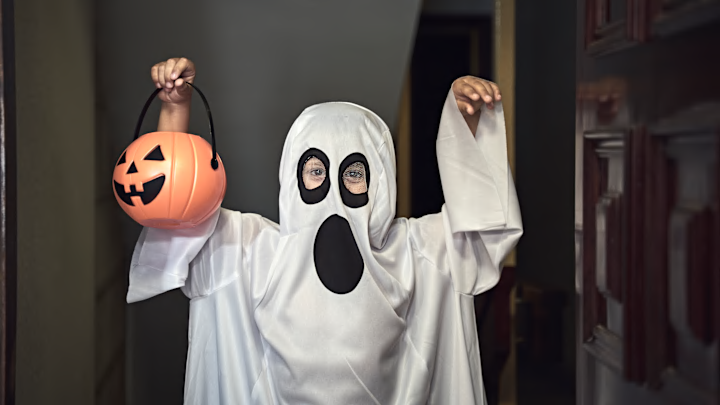For most kids in the United States, October 31 is a time to grab a bag and solicit candy door to door. But the city of Des Moines, Iowa, has been a longtime exception. City officials there have discouraged trick or treating on Halloween since 1938. This year, they’ll finally be in sync with the rest of the country.
According to the Associated Press, Des Moines clamped down on candy seekers going around on October 31 after bouts of vandalism and mischief annoyed adults in the late 1930s. In 1938, police responded to over 500 complaints of fairly serious “tricks” that included heaving bricks and starting fires.
Eager to quell these ruffians, the city directed children to dress up on October 30, or Halloween eve. Instead of “tricks,” they were advised to offer up jokes, songs, or poetry, all in an effort to promote better behavior (and all in a limited window of time that usually ended around 8 p.m.). While this didn’t totally resolve problems—in the first year, one group of kids reportedly tossed a kerosene-soaked rag into a home that started a fire—it seemed to dampen the aspirations of young criminals.
So what changed this year? Inclement weather. Thunderstorms and possibly hail are expected to blanket the city Wednesday, prompting a shift in plans over to Thursday, when Halloween actually lands.
“To my knowledge, it has never been moved or canceled since it was established after Halloween in 1938,” Assistant city manager Jen Schulte told the AP. “However, the safety of our residents, families and children is always our top priority and led to the change in this year’s scheduled Beggars’ Night.”
Schulte is referring to one of the many names regions have adopted for the night before Halloween. In Philadelphia and New Jersey, it’s been referred to as Mischief Night; in Detroit, Devil’s Night; in Cincinnati, Damage Night. Most cities experience an uptick in property damage or vandalism on October 30. Des Moines, meanwhile, has been one of the few locations where delinquency was kept to a minimum.
Des Moines isn’t the only place to put guardrails around Halloween festivities. Several towns in Virginia had (or have) ordinances that restict kids over 12 from wearing a mask or asking for candy.
Some legal experts believe the Halloween crackdowns could be a First Amendment issue, if one were to pursue such a case. “The Supreme Court has repeatedly upheld the right of individuals to engage in door-to-door solicitation for a variety of causes, including expressive activity and charitable fundraising,” attorney Daniel Ortner wrote in 2019. “Trick-or-treating is consistent with this tradition of expressive door-to-door activity. A trick-or-treater’s costume can be a form of speech protected against government censorship. Costumes are a way for people to express their likes and dislikes, and even to comment on politics and social issues.”
It’s unclear whether Des Moines will revert to its unique tradition next year or whether it will continue to celebrate Halloween on the 31st. That might depend on how many tricks are played on Thursday—though the city isn’t giving potential hooligans much leeway. They still need to wrap up their outings by 8 p.m.
